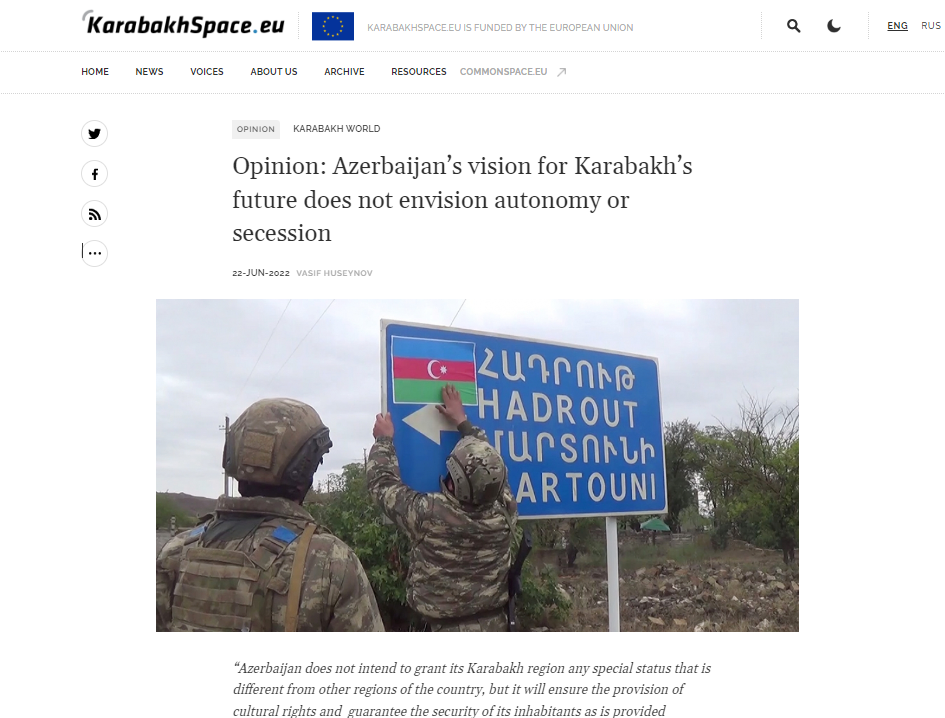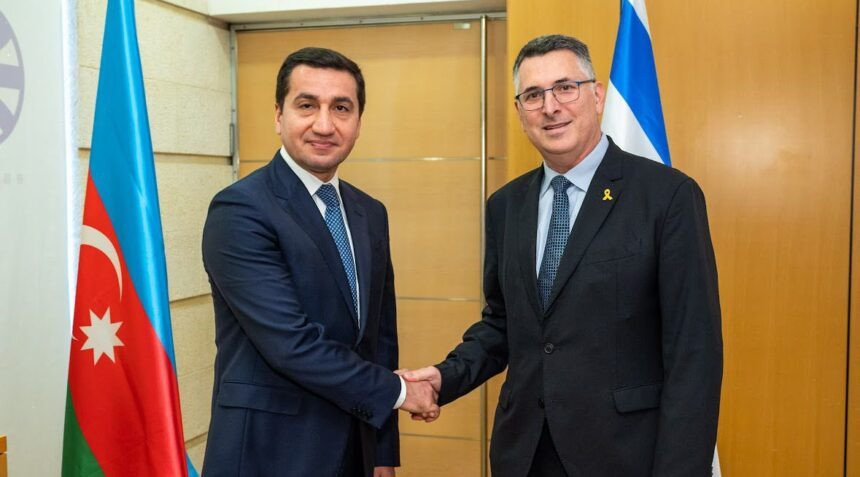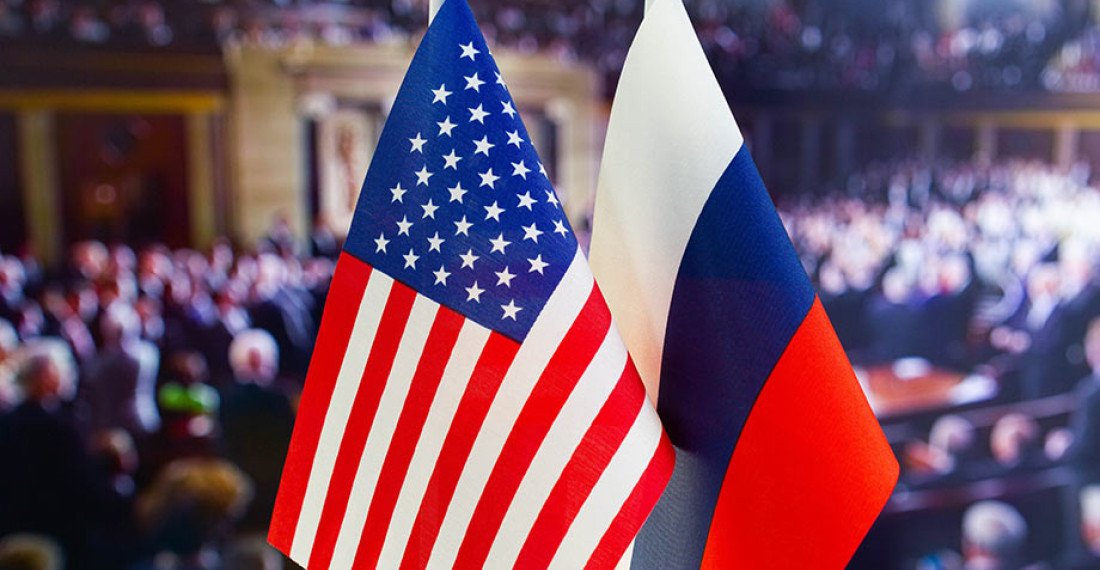Azerbaijan does not intend to grant its Karabakh region any special status that is different from other regions of the country, but it will ensure the provision of cultural rights and guarantee the security of its inhabitants as is provided throughout the rest of the Republic of Azerbaijan”, says Vasif Husseynov in this op-ed for commonspace.eu He says that Baku and Yerevan can agree on the specific arrangements under which these are provided. “The temporary deployment of international observer missions of the United Nations, the OSCE or the European Union can be also considered to ensure stable and peaceful transition of the region under the control of Azerbaijani government.“
As the peace negotiations between Armenia and Azerbaijan proceed and mark some progress, a debate has gained momentum amongst local and international observers about the future of the part of Karabakh region of Azerbaijan that is temporarily under the control of Russian peacekeepers. For a group of commentators, the region would reach peace and stability if Azerbaijan agrees to grant autonomy to the region. For example, Kamal Makili-Aliyev, a Sweden-based Azerbaijani scholar, argues that an autonomy status akin to that Finland granted to Aland islands may be a solution to this conundrum.
For some Armenians, this is unacceptable as separatist groups in the Karabakh region do not see a future under the sovereignty of Azerbaijan. They insist on the right of self-determination and hope for prospects of secession and eventually unification with Armenia or Russia. For official Baku and many Azerbaijanis autonomy as a solution is off the table, while a self-determination procedure with a secession possibility is not even something to be discussed.
Although some Armenian experts and reactionary political forces still vehemently claim the opposite, neither international law nor Soviet law provide a legal ground for the secession of the Karabakh region. One recent academic study on this subject by the University of North Carolina School of Law finds that “…the NKAO’s [Nagorno-Karabakh Autonomous Oblast] bids for independence under both the Soviet Union and the current state of Azerbaijan do not seem legitimate through either Soviet law or international law…”. This fact is something that is acknowledged by increasingly more Armenians including the government of Prime Minister Pashinyan. It is not clear what the Armenians who argue the opposite want to achieve. The post-Soviet history of the conflict clearly demonstrated that these claims bring only violence and bloodshed to the region as Azerbaijan would never give up its sovereign territories to separatists.
The above-mentioned study concludes that “it appears the violent tug-of-war over the territory will continue until a peaceful settlement can be reached, or one party obtains enough of a military advantage to end the question of Nagorno-Karabakh once and for all”. Following the Second Karabakh War, President Ilham Aliyev clearly stated that his country does not intend to apply the use of force to reintegrate the parts of Karabakh where Russian peacekeeping mission has been deployed. Hence, Azerbaijan seeks to restore its sovereignty over the region via peaceful methods.
In this context, for the government of Azerbaijan and many Azerbaijanis, including myself, autonomy is not a viable or a sustainable solution to the question. Prior to the 44 Day War, Azerbaijan was proposing the highest autonomy to the region, because Baku was ready to make maximum compromises within international law to resolve the conflict peacefully. Unfortunately, the Armenian side rejected these proposals and abused the negotiations to reinforce the outcomes of the First Karabakh War. It would be therefore irrational for Azerbaijan to return to this proposal after so many sacrifices the country had to make during the 44 Day War. The Soviet history of the conflict demonstrated that separatist groups in Karabakh abuse autonomy as a way of gradually minimizing links with the central government of Azerbaijan and eventually to raise the demand for miatsum [Armenian word for “unification”] with Armenia at the first opportunity. A representative of the separatist movement in Karabakh recently indirectly admitted in an interview with Ria Novosti [the interview was later removed from the website of the agency], that the end goal of the “independence” movement is still unification with Armenia. Azerbaijan therefore cannot agree to this project.
Thus, Azerbaijan does not intend to grant its Karabakh region any special status that is different from other regions of the country, but it will ensure the provision of cultural rights and guarantee the security of its inhabitants as is provided throughout the rest of the Republic of Azerbaijan. The sides [i.e., Baku and Yerevan] can agree on the specific arrangements under which these are provided. The temporary deployment of international observer missions of the United Nations, the OSCE or the European Union can be also considered to ensure stable and peaceful transition of the region under the control of Azerbaijani government.
Both sides need to acknowledge that this process cannot happen overnight and will take a period of time to generate trust and confidence between the two peoples. The opening of regional transportation routes, the launch of interstate mobilities, communications, the delimitation of interstate borders, a peace treaty on the basis of mutual recognition of each other’s territorial integrity, etc. need to precede any tangible move concerning the reintegration of the Karabakhi Armenians to the society of Azerbaijan. As President Aliyev and many others often mention, Armenians and Azerbaijanis peacefully live together in many other countries including Georgia. They used to live and now can live together in the Karabakh region as well.








